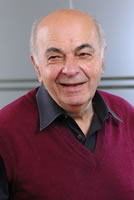
I have just learnt of the death last month of Sol Encel, Emeritus Professor of Sociology at the University of New South Wales, and a leading Australian sociologist, scenario planner, and futures thinker. I took a course on futurology with him two decades ago, and it was one of the most interesting courses I ever studied. This was not due to Encel himself, at least not directly, who appeared in human form only at the first lecture.
He told us he was a very busy and important man, and would certainly not have the time to spare to attend any of the subsequent lectures in the course. Instead, he had arranged a series of guest lectures for us, on a variety of topics related to futures studies, futurology, and forecasting. Because he was genuinely important, his professional network was immense and impressive, and so the guest speakers he had invited were a diverse group of prominent people, from different industries, academic disciplines, professions, politics and organizations, each with interesting perspectives or experiences on the topic of futures and prognosis. The talks they gave were absolutely fascinating.
To accommodate the guest speakers, the lectures were held in the early evening, after normal working hours. Because of this unusual timing, and because the course assessment comprised only an essay, student attendance at the lectures soon fell sharply. Often I turned up to find I was the only student present. These small classes presented superb opportunities to meet and talk with the guest speakers, conversations that usually adjourned to a cafe or a bar nearby. I learnt a great deal about the subject of forecasting, futures, strategic planning, and prognosis, particularly in real organizations with real stakeholders, from these interactions. Since he chose these guests, I thus sincerely count Sol Encel as one of the important influences on my thinking about futures.
Here, in a tribute from the Australian Broadcasting Commission, is a radio broadcast Encel made in 1981 about Andrei Sakharov. It is interesting that there appears to have been speculation in the West then has to how the so-called father of the Soviet nuclear bomb could have become a supporter of dissidents. This question worried, too, the KGB, whose answer was one Vadim Delone, poet. And here, almost a month after Solomon Encel’s death, is his obituary in the Sydney Morning Herald. One wonders why this took so long to be published.
0 Responses to “Vale: Sol Encel”